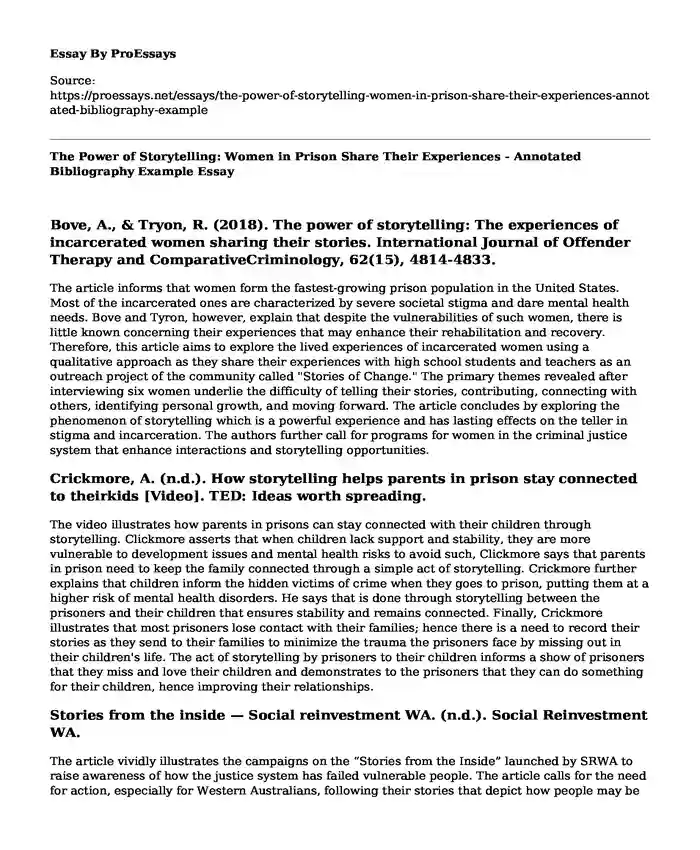Bove, A., & Tryon, R. (2018). The power of storytelling: The experiences of incarcerated women sharing their stories. International Journal of Offender Therapy and ComparativeCriminology, 62(15), 4814-4833.
The article informs that women form the fastest-growing prison population in the United States. Most of the incarcerated ones are characterized by severe societal stigma and dare mental health needs. Bove and Tyron, however, explain that despite the vulnerabilities of such women, there is little known concerning their experiences that may enhance their rehabilitation and recovery. Therefore, this article aims to explore the lived experiences of incarcerated women using a qualitative approach as they share their experiences with high school students and teachers as an outreach project of the community called "Stories of Change." The primary themes revealed after interviewing six women underlie the difficulty of telling their stories, contributing, connecting with others, identifying personal growth, and moving forward. The article concludes by exploring the phenomenon of storytelling which is a powerful experience and has lasting effects on the teller in stigma and incarceration. The authors further call for programs for women in the criminal justice system that enhance interactions and storytelling opportunities.
Crickmore, A. (n.d.). How storytelling helps parents in prison stay connected to theirkids [Video]. TED: Ideas worth spreading.
The video illustrates how parents in prisons can stay connected with their children through storytelling. Clickmore asserts that when children lack support and stability, they are more vulnerable to development issues and mental health risks to avoid such, Clickmore says that parents in prison need to keep the family connected through a simple act of storytelling. Crickmore further explains that children inform the hidden victims of crime when they goes to prison, putting them at a higher risk of mental health disorders. He says that is done through storytelling between the prisoners and their children that ensures stability and remains connected. Finally, Crickmore illustrates that most prisoners lose contact with their families; hence there is a need to record their stories as they send to their families to minimize the trauma the prisoners face by missing out in their children's life. The act of storytelling by prisoners to their children informs a show of prisoners that they miss and love their children and demonstrates to the prisoners that they can do something for their children, hence improving their relationships.
Stories from the inside — Social reinvestment WA. (n.d.). Social Reinvestment WA.
The article vividly illustrates the campaigns on the “Stories from the Inside” launched by SRWA to raise awareness of how the justice system has failed vulnerable people. The article calls for the need for action, especially for Western Australians, following their stories that depict how people may be marginalized and vulnerable in the justice system. The article further suggests a better system that underscores the investment of new approaches to help build safe communities smart justice and healthy families. Finally, the article illustrates its successful development of video stories, podcasts, and storybooks and calls for worldwide support in spreading alternative social reinvestment and educating Western Australians on the social justice system realities.
The stories of ACT women in prison: 10 years after the opening of the AMC. (2019, August 1).Women's Centre for Health Matters, Canberra. https://www.wchm.org.au/the-stories-ofact-women-in-prison-10-years-after-the-opening-of-the-amc/
The article provokes consciousness of the stories about women who are in prisons and those released from prisons. In the article, women who have spent most of their time in prison and those already out can elaborate to others whenever they appear in courts or help establish their lives. According to the 2009 report by the Women's Center for Health Matters (WCHM), those women are never given a chance to tell their entire stories without being judged and denied some services. For such reasons, WCHM has encouraged women from AMC not only to share their encounters and history but also to elaborate on the reasons that led to their imprisonments, coupled with their hopes for the future. Finally, the article goes ahead and elucidates the stories of 11 women who faced AMC imprisonment as they share their stories with WCHM.
References
Bove, A., & Tryon, R. (2018). The power of storytelling: The experiences of incarcerated women sharing their stories. International Journal of Offender Therapy and ComparativeCriminology, 62(15), 4814-4833. https://doi.org/10.1177/0306624x18785100
Crickmore, A. (n.d.). How storytelling helps parents in prison stay connected to their kids [Video]. TED: Ideas worth spreading. https://www.ted.com/talks/alan_crickmore_how_storytelling_helps_parents_in_prison_tay_connected_to_their_kids?language=en
Stories from the inside — Social reinvestment WA. (n.d.). Social Reinvestment WA. https://www.socialreinvestmentwa.org.au/stories
The stories of ACT women in prison: 10 years after the opening of the AMC. (2019, August 1).Women's Centre for Health Matters, Canberra. https://www.wchm.org.au/the-stories-ofact-women-in-prison-10-years-after-the-opening-of-the-amc/
Cite this page
The Power of Storytelling: Women in Prison Share Their Experiences - Annotated Bibliography Example. (2023, Nov 21). Retrieved from https://proessays.net/essays/the-power-of-storytelling-women-in-prison-share-their-experiences-annotated-bibliography-example
If you are the original author of this essay and no longer wish to have it published on the ProEssays website, please click below to request its removal:
- Article Review Example on Biological Criminal Behavior
- Comparative Analysis of Women's Social Cultural Empowerment
- Essay Sample on Hate Crime on Campus
- Death Penalty Debate Essay
- Impacts of the Stolen Generations on Australian Life
- Essay Sample on What Makes an American: Exploring Beyond Citizenship
- Essay Sample on Amish: Working Together for Unity & Stability







